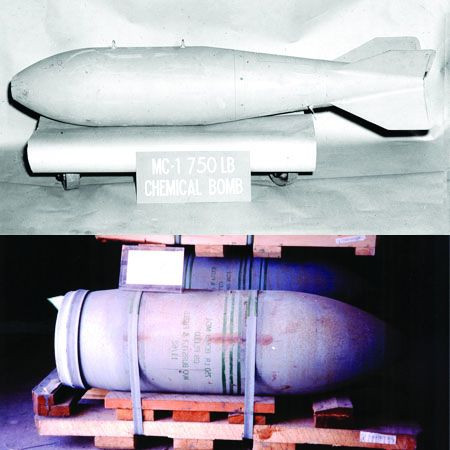Anonymous Insider Confirms Sarin Stockpile in Syria

A former scientist involved in the Syrian chemical weapons program said the regime of President Bashar al-Assad has a stockpile that includes 700 tons of the nerve agent sarin. The chemist spoke to Al Jazeera on condition of anonymity after he fled from Syria.
Sarin is classified as a nerve agent. Immediate detection of sarin may be difficult because it has no odor; exposure is usually by way of breathing contaminated air, eating contaminated food, drinking contaminated water, or touching contaminated surfaces. Exposure to large doses of sarin by any route may result in loss of consciousness, convulsions, paralysis and respiratory failure possibly leading to death. A small drop of sarin on the skin can cause sweating and muscle twitching at the point of contact.
Within seconds to hours of exposure, low or moderate doses of sarin may cause any or all of the following symptoms: runny nose, watery eyes, small, pinpoint pupils, eye pain, blurred vision, drooling and excessive sweating, cough, chest tightness, rapid breathing, diarrhea, increased urination, confusion, drowsiness, weakness, headache, nausea, vomiting, and/or abdominal pain, slow or fast heart rate, low or high blood pressure
Mild or moderately exposed people usually recover completely.
Consistent with other intelligence reports, the chemist said that Assad's chemical weapons arsenal also contains mustard gas, which was first introduced as a chemical warfare agent during World War I, as well as VX, considered by many experts to be the deadliest of all nerve agents. (It is both tasteless and odorless.) The chemist also reported Assad's stockpile includes at least 3,000 aerial bombs that could be filled with chemical agents as well as more than 100 chemical warheads for Scud missiles. Some Western intelligence agencies believe that Syria also has access to tabun nerve agent, but the chemist said such reports are untrue. Of the known chemical warfare agents, nerve agents are the most rapidly acting and toxic.
He said that he was speaking out "to dispel the myths on chemical weapons in Syria." He alleges that the regime has only used sarin nerve gas in small quantities to halt rebel advances.
"The intention was to incapacitate rebels and force them out of strategic areas, while keeping the deaths among their ranks limited," the chemist said. Purportedly, sarin was used in four towns in the suburbs of Damascus, in Aleppo's Sheikh Maksoud district, in Idlib's Saraqeb town, and in Homs' al-Khalidiyeh district.
Al Jazeera was able to verify the scientist's former position at the chemistry institute of the Centre for Scientific Studies and Research (CSSR), Syria's main agency for the development and enhancement of weaponry. Syria keeps its scientists under heavy surveillance, even keeping some under 24-hour guard, the chemist said. He also said that the regime is not likely to unleash its chemical stockpiles unless it "no longer cares about the world knowing."
Before becoming Syria's president, Bashar al-Assad studied medicine at the University of Damascus and served as an army doctor at a Damascus military hospital.
Read about the UN's ongoing hunt for Sarin in Syria.



























